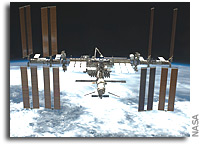NASA Request for Information (RFI) for Liquid Crystal Research on the International Space Station

RFI Number: NNH14ZTT002L
Release Date: May 23, 2014
Responses Due Date: June 20, 2014
NASA’s Space Life and Physical Sciences Division supports research conducted on the International Space Station (ISS). The orbital conditions on the ISS provide an environment where gravity-driven phenomena, such as buoyancy driven convection, are nearly negligible. Gravity strongly affects fluid behavior by creating forces that drive motion, shape phase boundaries and compressed gases. The need for a better understanding of fluid physics has created a vigorous, multidisciplinary research community whose ongoing vitality is marked by the continuous emergence of new fields in both basic and applied science. In particular, the low-gravity environment offers a unique opportunity for the study of fluid physics and transport phenomena. Experiments conducted in space have yielded rich results. Some were unexpected and most could not be observed in Earth-based labs. These results provided valuable insights into fundamental fluid behavior that apply to both terrestrial and space environments.
The ISS also provides a very unique opportunity to study many aspects of liquid crystal behavior. Quantized in nature, the study of freely suspended liquid crystal (FSLC) films exhibits a combination of physical characteristics that have made them uniquely exciting systems for the study of equilibrium and out-of-equilibrium phenomena in reduced dimensionality, for example liquid crystal ordering and fluctuations in two dimensions and the effects of finite size on liquid crystal phase transitions. In the absence of gravity it is possible to exploit the unique characteristics of freely suspended liquid crystals to advance the understanding of fluid state physics. Observations of coarsening dynamics of 2-D island emulsions and the cross-coupling between flow and molecular orientation can be studied as well as the 2-D thermal-capillary effects and interactions between islands and droplets without gravitational sedimentation and convection of the films or surrounding air. Onboard the ISS, the Observation and Analysis of Smectic Islands in Space (OASIS) is the first study of FSLC films in microgravity environment and presents extraordinary opportunities for the study of fluid dynamic and thermodynamic behavior in reduced dimensionality, and for the exploration of fundamental non-equilibrium fluid interfacial phenomena.
Concurrent to the fundamental complex fluid physics research based upon the liquid crystals, exploiting the unique characteristics of different types of liquid crystals is rapidly revolutionizing the multibillion dollar consumer electronics industries, and as well as in the control systems using state of the art high resolution displays in many other industries and consumer products. Product-driven research for many different types of new liquid crystal materials has made an impact to this industry. Taking advantage of the gravity and convective free environment onboard the ISS, will provide a deeper insight to the search for new liquid crystal materials.
The purpose of this RFI is to help NASA develop future research directions for the microgravity complex fluids program, particularly in liquid crystals. Input to this RFI will be considered by NASA in developing recommendations for future ISS liquid crystal research. NASA is planning to provide a forum for presentation and discussion of these recommendations at the 25th International Liquid Crystal Conference to be held June 29th– July 4th in Dublin, Ireland (http://www.ilcc2014.com). Facilitating the future research directions is a new Physical Science (PS) Informatics System that will provide global access to all past, present and future ISS PS experimental data. This will promote an open source approach to scientific data analysis and become a gateway to hundreds of new ISS-based scientific investigations that will define the next generation of ISS experiments. The subsequent multiplication of investigators with data access will greatly enhance discovery and innovation.
You are invited to provide input to this RFI by describing mission-oriented studies of gravity- and convection-dependent phenomena of liquid crystal observation, theory, or modeling activity that makes use of the ISS environment. The motivation is to advance an existing or new scientific objective, to contribute to the fundamental understanding of liquid crystal research, and to facilitate the connection between science and the rapid advancements in the consumer electronics and optical industries. All responses will be considered non-proprietary public information for distribution with attribution. You are encouraged to submit your RFI response as early as possible.
NASA Primary Point of Contact (POC):
NASA Headquarters
E-mail: francis.p.chiaramonte@nasa.gov
Phone: 202-358-0693
To respond to this RFI, answers to a series of specific questions must be submitted electronically using the NASA Solicitation and Proposal Integrated Review and Evaluation System (NSPIRES)http://nspires.nasaprs.com. The full RFI and submission instructions can be found at http://tinyurl.com/lcLAB-RFI
This is a Request for Information (RFI) only and does not constitute a commitment, implied or otherwise, that the National Aeronautics and Space Administration (NASA) will take procurement action in this matter. The information gathered will be considered by NASA to help develop future research directions for the microgravity combustion science and fluid physics programs.








